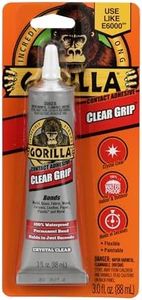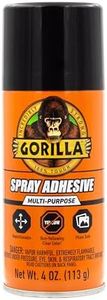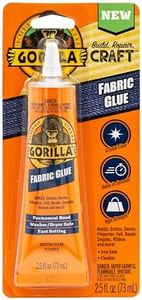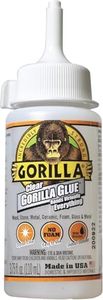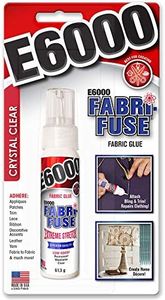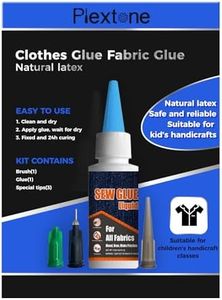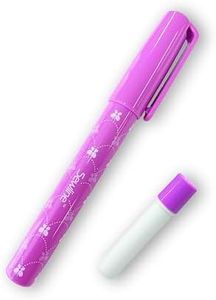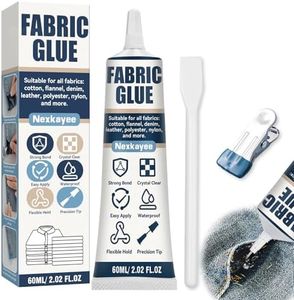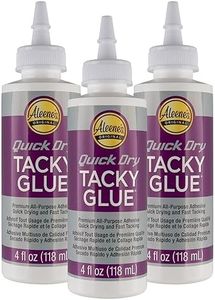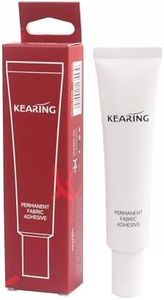We Use CookiesWe use cookies to enhance the security, performance,
functionality and for analytical and promotional activities. By continuing to browse this site you
are agreeing to our privacy policy
10 Best Fabric Glues
From leading brands and best sellers available on the web.By clicking on a link to a third party's website, log data is shared with that third party.
Buying Guide for the Best Fabric Glues
Choosing the right fabric glue can make a huge difference in your crafting or clothing repair projects. Fabric glues are designed to bond textiles together without sewing, and they can be a quick and convenient solution for everything from hemming garments to attaching decorative appliques. When picking a fabric glue, it's important to focus on what types of fabrics you'll be working with, how permanent or flexible you want the bond to be, how the glue holds up to washing, and the glue's ease of use. Understanding the main features will help you find one that meets your unique needs.Bond StrengthBond strength refers to how firmly the glue holds fabric pieces together once it dries. For lightweight projects like attaching lace or patches, a medium bond may be enough. If you’re joining heavier or thicker fabrics, like denim or canvas, you’ll want a glue that mentions a strong or industrial bond. Consider how often the item will be used or washed—projects that are handled a lot demand higher bond strength for durability.
Drying TimeDrying time tells you how long you need to wait before the glued pieces stay together or before using or wearing your project. Fast-drying options are great for quick fixes or small projects, often drying within minutes. Other glues take several hours to cure fully, but these may form a more solid and longer-lasting bond. If you need quick results, look for fast-drying. If you can be patient for extra durability, choose slow-drying.
Flexibility After DryingThis spec describes whether the glue stays soft and bends with the fabric, or becomes stiff and rigid. Flexible glues move with the material, keeping fabrics comfortable and wearable, which is ideal for most clothing and crafts. Rigid glues might work for decorative pieces that won’t be handled much. If your project involves clothing, pillow covers, or soft accessories, always opt for glues labeled as flexible after drying.
WashabilityWashability is how well the glued area withstands laundering. Some fabric glues are specially formulated to be water-resistant or washable, meaning they can be washed by hand or in a machine without falling apart. Others are suitable for items that won’t be washed. For garments, home textiles, or anything likely to need cleaning, choose a glue advertised as machine-washable or water-resistant. For decorative or one-off crafts, this may be less important.
Suitability for Fabric TypesNot all glues work with every type of fabric. Some adhere better to synthetics, others to natural fibers, and some are multi-purpose. The packaging usually lists compatible materials like cotton, polyester, leather, or felt. Think about what fabrics you’ll be bonding—if you use mixed textiles in your crafts, look for all-purpose glues. If you’re focusing on one fabric type, pick a targeted formula for best results.
Application MethodFabric glues come in various forms like squeeze bottles, pens, or tubes. Bottles with fine tips allow for precise application, which is great for detailed work or small areas. Wider applicators or brush-tips are better for larger surfaces. For quick, small repairs, pens or small tubes are convenient. Choose an application method that matches the size and precision requirements of your typical projects.
